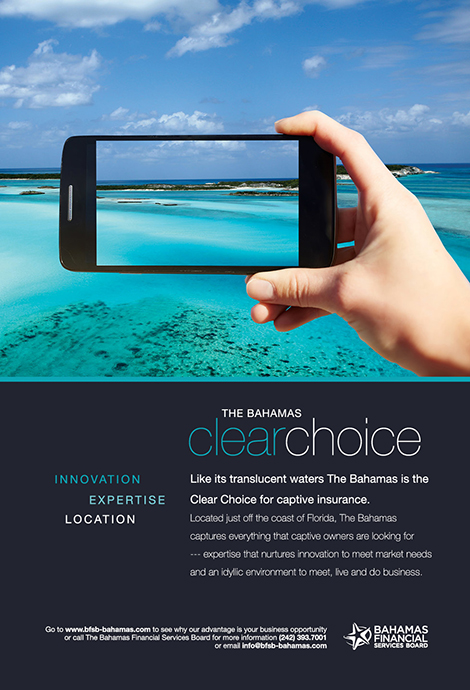A record number of delegates gathered at the Fairmont Southampton for this year’s Bermuda Captive Conference, where the new e-filing system, Solvency II and emerging markets dominated discussion.
A record number of delegates gathered at the Fairmont Southampton for this year’s Bermuda Captive Conference, where the new e-filing system, Solvency II and emerging markets dominated discussion.
From 2017, Bermuda will introduce a new electronic filing system, E-SFR, for captives in classes 1, 2, 3, A and B, and special purpose insurers.
The new system will make filing more efficient for captive insurers and allows the Bermuda Monetary Authority (BMA) to collect regulatory information, including statistical data on segregated cells and own risk management, according to Ross Webber, CEO of the Bermuda Business Development Agency (BDA).
Webber added that the filing system will increase functionality, data uploads, reporting and workflow. It will also enable more accurate and timely analysis of insurer data and information, and the ability to use aggregated data to further develop Bermuda captives.
Company information, underwriting analysis, segregated accounts and own risk assessment will be among the required information.
E-filing wasn’t the only update from the BMA. Graham Lamb, assistant director of insurance at the BMA, revealed the authority will be implementing its new insurance managers’ regime.
The new risk-based supervisory regime comes in response to the BMA recognising the key role that insurance managers play in the Bermuda market to both captive and commercial insurers.
Insurance managers in Bermuda will have until 31 December to move onto the new risk-based supervisory regime.
The BMA announced in its 2016 business plan that it intended to build a risk-based supervisory regime for insurance managers, which would include a change in Bermuda’s insurance legislation and the introduction of a new Insurance Managers’ Code of Conduct.
In April, the BMA published a draft of the changes for consultation, including a consultation paper on the proposed Insurance Amendment Act 2016 and the new Insurance Management Code of Conduct. The consultation closed at the end of May and the BMA plans for the transitional period for the new rules to run until 31 December.
Addressing attendees in another conference session, Lamb said the key elements the BMA is looking to include in the new regime are the role of the board, internal management controls, outsourcing, reputation, corporate governance frameworks and cooperation with regulatory authorities.
Lamb also revealed that the BMA is going to introduce a filing for insurance managers. It will be an annual filing due six months after the financial year-end, and would allow the BMA to assess the insurance managers’ operations and conduct appropriate risk-based supervision.
After Bermuda achieved equivalency last year, Solvency II was a popular topic throughout the conference.
The decision to allow non-EU countries to become equivalent allows EU insurers to use local rules to report on their operations in third countries, and offers the option for third country-insurers to operate in the EU without complying with all EU rules.
Bermuda decided on a bifurcated approach to Solvency II, whereby only commercial insurers would qualify as Solvency II equivalent, leaving captives out of its scope.
But Swan insisted that the regime is in alignment with the International Association Insurance Supervisors (IAIS) standards, saying: “As long as Bermuda is achieving this, our main goal is reached.”
He added that Bermuda did not seek equivalence for captives because its European footprint is not big enough, however, he suggested captives benefit from the bifurcated approach.
Alan Gier, global director for risk management and insurance at General Motors Company, indicated that captives could seek Solvency II equivalence in the future, saying: “We don’t know what the future holds, in future we may change the way we configure captives.”
Another big conversation point was the expansion of emerging markets such as Latin America and Canada into the captive insurance space.
Grainne Richmond, vice president of Dyna Management Services and president of the Bermuda Insurance Management Association (BIMA), addressed the panel with a question about the captive growth in the Latin American and Canadian markets.
According to Jill Husbands, head of office and managing director of Marsh Bermuda, there has been particularly large growth in Latin America, while Canada is moving at a much slower pace.
Husbands said: “The price of oil in Canada has impacted the speed to incorporation for some of those companies.”
She believes risk management is becoming part of the regime for many companies and more opportunities will arise in Asia and Africa.
Swan revealed that only one captive was registered in Bermuda from Canada in 2015, but the domicile saw five captives licensed from Latin America.
He said: “It takes a while to establish a relationship, and our Latin America relationship has predominantly been going on for five years. We hope to see a number of additional captives coming from that area.”
Webber commented: “We want to see Chile to catch up with that growth. We are starting to see more and more companies climb onto the conveyor belt and make their way to Bermuda.”
Since the leak of the The Panama Papers, other offshore domiciles, including Bermuda, have been caught in the crossfire, and labelled as ‘tax havens’, heard attendees.
Webber insisted the leak gave Bermuda the chance to show the world that it has nothing to hide, however, he said the domicile could do a better job of protecting its reputation.
Webber told attendees that until 2008, Bermuda had no reason to be protective of its reputation, but the global recession changed the game and every domicile had to become “more aggressive”. He continued to suggest that Bermuda has become an easy target to the ‘tax haven’ label.
Husbands believes Bermuda is currently sitting in a strong position. She said: “Bermuda should have stood up sooner to inform everyone that it is not a tax haven or about promoting unwelcome business.”
According to Swan, the support of all its associations has helped to protect Bermuda’s reputation as a domicile.
Richmond commented: “I think Bermuda has got some great momentum but it would be great to sign up more clients.”
The Bermuda Captive Conference will be held at the later date of 11 to 13 September next year due to the Americas Cup finals, which are taking place throughout the month of June. The conference will return to the month of June in 2018.





